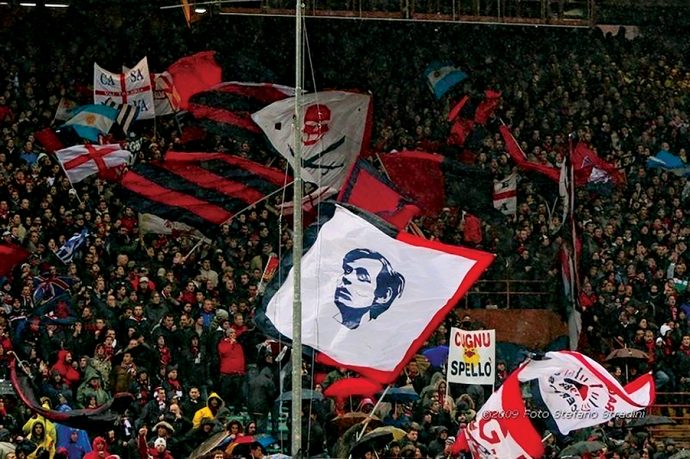The mighty Lanterna (lighthouse) dominated the bay, and the sun was taking his nap right behind the Alps.
The first boy playing the very first soccer match was distracted — and a goal was scored. In that moment, he knew it — that was the best game ever.
We are in Genova, Italy, even though the proper birthplace of soccer — which has ancient antecedents — is a thousand kilometers northwest in England. Genova is the hometown of the green sauce we all cook and love, pesto; the most important poet and songwriter Italy has produced in the second half of the last century, Fabrizio De Andrè; and, of course, of Italian calcio (football.)
This game we breathe was born here, in the town they call “the Superb.” It was born on the streets and, thanks to this it is easily scalable: You can play anywhere in any condition, even and especially in Genova, a narrow town, with its tiny, steep roads running down to the sea. Genova is indeed a haven town, its port being one of the oldest and most prosperous in Italian history, its economy working in the perfect balance that the territory it sits in implies — built at the foot of the mountains, right in front of the Ligurian Sea. Genova seems to embody the definition of economics itself — “the science which studies human behavior as a relationship between ends and scarce means.”
Scarcity is the only word we need to explain how soccer was born in Genova and not in any other place in Italy. I can almost picture a group of Genovesi friends watching a crew of English sailors playing this game on the docks of the port and thinking: “This is the solution then.” And I call it a solution, because Genova’s territorial conformation used to represent a problem in the games they would play back then — talking scarcity of resources. No net, rope or any other supplementary material other than a ball is needed.
You might think this is history but go to Genova or anywhere in Italy, from the Alps to Lampedusa, and you will find for yourself the game has never changed since the 19th century. The passion we breathe not only at the stadium, but in any bar, shop or house where the local team is a religion, lies in our DNA and cannot be taken out. The English called it football. We call it with its exact translation, calcio. Italy is calcio, as much as calcio is Italy. De Andrè himself was a huge soccer fan, cheering for the first football team ever born in Italy, needless to say — the team of his hometown, Genoa FC. Faber, this was his nickname, has even seen his poems and songs in schoolbooks, Bob Dylan-like. And still, when facing the love of his life, he used to say: “I would write Genoa a love song, but I am way too into her.” Isn’t this the biggest proof of love one could ever give — utmost and silent admiration?
It is a big leap from 1893, when the Genoa Football & Cricket Club was born, to now. Now — the era of modern soccer, of TVs instead of stadiums, of stellar contracts instead of everlasting love and faith in a single set of colors. And still, I cannot think about anything more exciting in the history of Italian soccer than attending the “Derby della Lanterna”— probably the oldest rivalry in Italy, the match in which the two teams from Genova face each other twice a year.
Another Sunday, another Genoa against Sampdoria moment. Or vice versa. From the Stadio Marassi uphill, everyone is cheering more than on any other day. The mighty Lanterna is dominating the bay and the sun will take his nap right behind the Alps. Someone will be distracted by the festive crowd, the red and blue, the red and blue and white and black, the drums, the beers — and a goal will be scored. In that moment, he’s gonna know it, once again — this is the best game ever.





